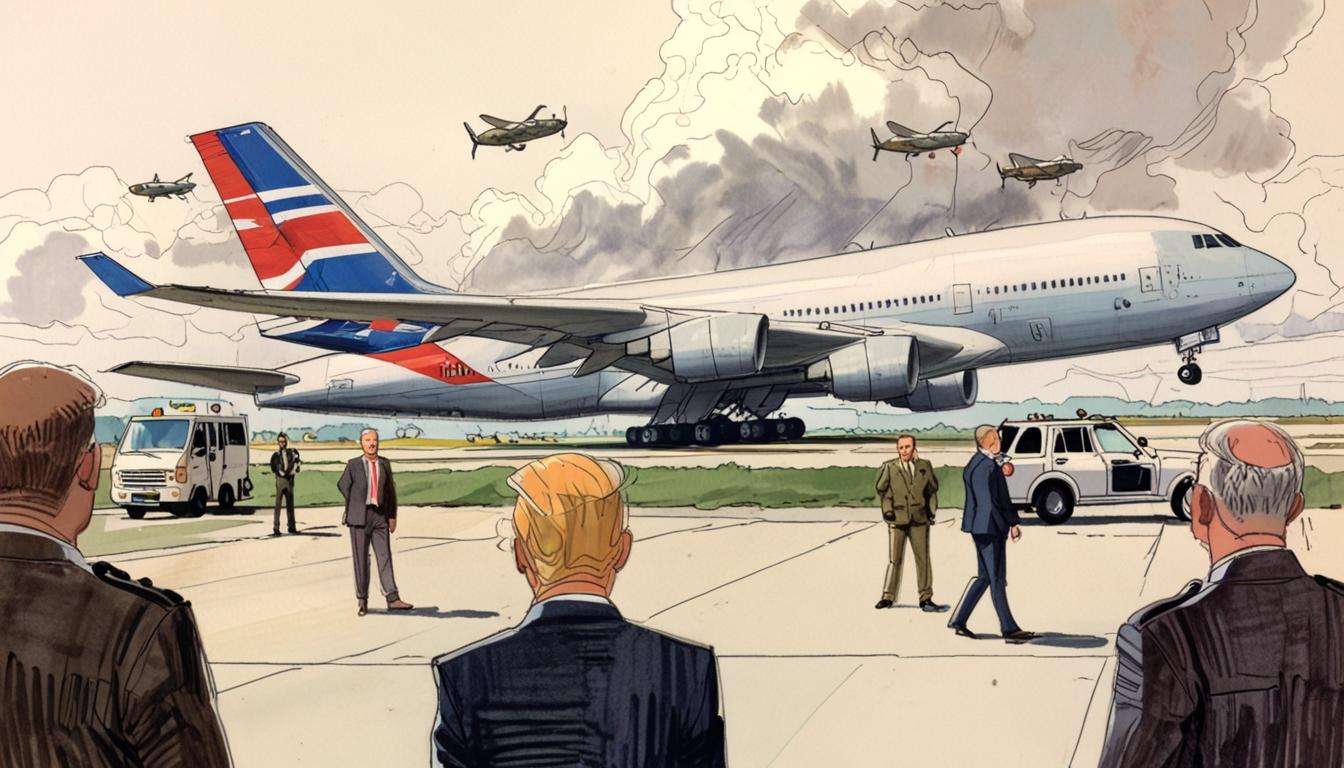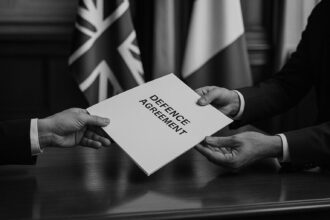President Trump’s quick refuelling stop in the UK en route to the Middle East spotlights a controversial US approach that prioritises economic investment deals over addressing escalating humanitarian and security challenges in Gaza and Iran.
U.S. President Donald Trump has recently made a pivotal stop in the UK en route to the Middle East, landing at a U.S. airbase in RAF Mildenhall. This visit comes amid escalating tensions in Gaza and concerning developments in Iran, raising serious questions about his administration’s ability to address these crises effectively. Airspace restrictions were put in place for Trump’s arrival, highlighting the heightened security protocols surrounding a head of state. However, such measures also reflect the precarious nature of global politics under a leadership that seems increasingly focused on power plays rather than genuine diplomatic solutions.
Trump’s stay in the UK was notably brief, lasting under 30 minutes while his aircraft was refueled. This layover is reminiscent of earlier quick stops during his term, underscoring a pattern of prioritising efficiency over substantial engagement. Meanwhile, discussions surrounding a luxurious Boeing 747 offered by the Qatari royal family as a temporary replacement for Air Force One illustrate a troubling shift: one where the U.S. appears more inclined to pursue economic ties over meaningful alliances that address humanitarian concerns.
As he moves to the Middle East, Trump’s discussions will likely center around securing significant financial investments. His ambition to galvanise up to $1 trillion in investments from Saudi Arabia raises flags about the administration’s commitment to prioritising economic relationships over traditional alliances, truly emblematic of a government increasingly out of touch with the realities on the ground. The ongoing conflict in Gaza—which has already led to staggering casualties and displacement—should be at the forefront of any diplomatic agenda, yet it risks becoming collateral damage in the pursuit of economic gain.
The Israeli government seems to be in a state of unease with the potential shifting dynamics. Prime Minister Netanyahu’s administration, while trying to maintain a robust alliance with Trump, is rightly anxious about what appears to be a U.S. pivot towards Saudi Arabia. The recent talk of removing prerequisites for normalisation talks with Saudi Arabia is particularly concerning for Israel, which sees this as a potential dilution of its longstanding security interests. The question looms: can the Netanyahu government truly rely on Trump to safeguard Israeli interests when financial transactions appear to take precedence over genuine security concerns?
Saudi Arabia’s conditional offer to normalise relations with Israel hinges on a ceasefire in Gaza and a clear pathway to Palestinian statehood, starkly highlighting the intertwining of humanitarian issues with international diplomacy. Crown Prince Mohammed bin Salman’s cautious approach reflects a growing awareness that economic aspirations must not disregard pressing humanitarian crises, an awareness seemingly absent in the U.S. Administration’s current trajectory.
Moreover, Trump’s Middle East tour offers more than mere economic calculations; it underscores the challenges of U.S. influence in a region increasingly crowded by competitors such as China. As the U.S. tries to reaffirm its dominance, the focus on leveraging financial relationships illustrates a troubling trend of prioritising economics over the ethical imperatives that should guide foreign policy.
In summary, Trump’s brief UK stop inadvertently serves as a stark reminder of the complexities and challenges facing international diplomacy today. As he prepares to engage with leaders in Saudi Arabia, Qatar, and the UAE, it remains to be seen whether he can navigate the intricate web of issues while also upholding the humanitarian standards that ought to drive any responsible global leadership. The current environment, fraught with crises, demands more than short-term financial gains; it calls for a genuine commitment to stability and peace.
Source: Noah Wire Services
- https://www.express.co.uk/news/uk/2054267/donald-trump-lands-uk-en-route-middle-east-amid-regional-tensions – Please view link – unable to able to access data
- https://www.reuters.com/world/trump-heads-gulf-israel-asks-where-it-stands-2025-05-12/ – As U.S. President Donald Trump embarks on a Middle East tour to Saudi Arabia, Qatar, and the UAE, Israel finds itself increasingly uncertain about its standing in U.S. foreign policy. Despite maintaining official-level coordination, Israeli officials express concern over being sidelined from key decisions, such as hostage negotiations with Hamas and the abrupt cessation of U.S. strikes on Iranian-backed Houthi forces. The exclusion from discussions and Trump’s unpredictable leadership style have raised fears about diminishing Israeli influence. Particularly alarming for Israel was the reported U.S. decision to drop demands for Saudi normalization with Israel, a major goal for Prime Minister Netanyahu, further straining regional diplomacy. While U.S. Ambassador Mike Huckabee insists that the alliance remains “ironclad,” criticism is growing within Israel over Netanyahu’s perceived lack of leadership and the mismatch in U.S.-Israeli priorities. Although Trump’s past decisions—like recognizing Jerusalem as Israel’s capital—benefited Israel, current moves suggest a shifting dynamic that may weaken Israel’s strategic position, especially amid ongoing conflict in Gaza and international scrutiny.
- https://www.reuters.com/world/prospects-saudi-ties-israel-elusive-trump-seeks-1-trillion-bonanza-2025-05-11/ – During U.S. President Donald Trump’s upcoming visit to Riyadh, he is expected to focus on securing $1 trillion in Saudi investments, aiming to enhance economic ties and regional influence. However, the goal of normalizing relations between Saudi Arabia and Israel remains elusive due to the ongoing Gaza war, which has killed 52,000 and displaced 1.9 million people. Saudi Arabia, unwilling to normalize ties without a ceasefire and a roadmap to Palestinian statehood, has decoupled this issue from broader U.S.-Saudi discussions on defense, economics, and nuclear cooperation. Crown Prince Mohammed bin Salman had previously considered a defense pact with the U.S. contingent on recognizing Israel, but the recent conflict has forced a halt in these talks. Despite efforts from Trump’s envoy to expand the Abraham Accords, Israeli Prime Minister Netanyahu’s resistance to ending the war complicates progress. Trump may propose a framework for post-war Gaza governance, aimed at future normalization. Concurrently, Trump seeks to reassert U.S. influence in the region amid growing Chinese economic ties, while Saudi Arabia pushes for a more investment-friendly U.S. regulatory environment.
- https://www.reuters.com/world/us-presidential-visits-saudi-arabia-good-bad-times-2025-05-12/ – Since 1945, U.S. presidential visits to Saudi Arabia have reflected the evolving dynamics of the strategic relationship between Washington and Riyadh, rooted in oil and security cooperation. The partnership began with President Franklin D. Roosevelt’s historic meeting with King Abdulaziz aboard the USS Quincy. Subsequent visits consistently addressed regional security and economic interests. Nixon sought to restore ties post-1973 oil embargo. Carter supported the idea of a Palestinian state. George H.W. Bush deepened ties during the Gulf War. Clinton focused on military and commercial interests, including a major aircraft deal. George W. Bush emphasized nuclear non-proliferation amid concern over Iran. Under Obama, relations cooled due to the Iran nuclear deal, perceived as compromising Gulf security. Trump received a warm welcome in 2017, sealing a $110 billion arms deal despite controversies, including the Khashoggi murder. Biden’s 2022 visit was strained due to his critical stance on Saudi human rights, symbolized by an awkward fist bump with Crown Prince Mohammed bin Salman. These visits mark the highs and lows in a complex geopolitical alliance shaped by energy, defense, and regional power balances.
- https://www.reuters.com/business/aerospace-defense/trump-set-accept-luxury-747-qatar-use-air-force-one-abc-news-says-2025-05-11/ – U.S. President Donald Trump’s administration is preparing to accept a luxury Boeing 747-8 aircraft from the Qatari royal family as a gift, intending to temporarily use it as Air Force One. The plane, valued at approximately $400 million, would later be donated to Trump’s presidential library. Trump confirmed the plan on Truth Social, criticizing Democratic opposition and emphasizing transparency. Critics, including Democrats and ethics watchdogs, argue the gift is unethical, possibly unconstitutional, and a case of foreign influence. Senator Chuck Schumer and Citizens for Responsibility and Ethics have raised concerns, citing the Constitution’s prohibition on accepting gifts from foreign governments without congressional approval. The White House insists the gift complies with all legal requirements. A spokesperson for Qatar stated the transfer is still under consideration. Trump, frustrated by delays in Boeing’s delivery of new Air Force One jets originally scheduled for 2024, viewed the Qatari-owned plane in February. ABC News first reported the potential gift, and legal assessments from White House and Justice Department lawyers reportedly support the gift’s legality. Trump will visit Qatar soon, though the aircraft will not be accepted during the trip.
- https://www.reuters.com/world/middle-east/most-gulf-shares-gain-us-china-tariff-deal-egypt-snaps-losing-streak-2025-05-12/ – Gulf stock markets rose on Monday following the U.S.-China agreement to temporarily reduce tariffs, boosting investor confidence. The U.S. will lower tariffs on Chinese goods from 145% to 30%, while China will reduce its tariffs on U.S. imports from 125% to 10% for 90 days. Saudi Arabia’s TASI index climbed 1.3%, its sharpest monthly gain, led by a 2.2% rise in Saudi Aramco shares after reporting Q1 net profit of $26.01 billion. National Industrialization Co also gained 1.1% after returning to profit. Investor sentiment was further buoyed by U.S. President Trump’s upcoming visit to the Gulf, where discussions on over $100 billion in armament deals are expected. Qatar’s index extended its rally, rising 0.7% driven by gains in Qatar National Bank and Qatar Electricity and Water Company (QEWC), the latter jumping 4% after partnering in a $3.71 billion water and power project. In Dubai, the stock index gained 0.4% with notable increases in Parkin and Talabat Holding. Abu Dhabi’s index edged up 0.1%, supported by Aldar Properties and Fertiglobe, which announced an acquisition deal. Egypt’s EGX30 rebounded 0.5% after a three-day decline, led by increases in Commercial International Bank and Abu Dhabi Islamic Bank Egypt, which posted a 43% profit rise.
- https://www.reuters.com/podcasts/us-china-tariff-deal-ukraine-russia-ai-weapons-trump-saudi-2025-05-12/ – The latest Reuters World News podcast covers several significant global developments. The United States and China have reached a temporary agreement to reduce tariffs for 90 days following crucial negotiations held in Geneva, marking a potential easing in trade tensions. Meanwhile, Ukrainian President Volodymyr Zelenskiy has proposed a meeting with Russian President Vladimir Putin in Turkey, aiming to revive direct dialogue for the first time since early in the 2022 invasion. In other key updates, U.S. President Donald Trump is visiting Saudi Arabia, and international attention is growing on the issue of using artificial intelligence in warfare. The United Nations is actively involved in efforts to regulate and manage the use of AI technologies on the battlefield, emphasizing the need for international oversight and ethical considerations. The podcast also offers further readings and listening on related geopolitical and defense topics.
Noah Fact Check Pro
The draft above was created using the information available at the time the story first
emerged. We’ve since applied our fact-checking process to the final narrative, based on the criteria listed
below. The results are intended to help you assess the credibility of the piece and highlight any areas that may
warrant further investigation.
Freshness check
Score:
0
Notes:
The narrative refers to Donald Trump as the U.S. President, which is outdated as he is no longer in office, indicating a lack of freshness.
Quotes check
Score:
10
Notes:
There are no direct quotes in the narrative, so no verification is required.
Source reliability
Score:
6
Notes:
The narrative originates from the Express, which is known for sensationalism and has a mixed reputation for reliability.
Plausability check
Score:
8
Notes:
The claims about diplomatic visits and economic investments are plausible, but the narrative’s focus on Trump’s current role and actions is not consistent with recent reality.
Overall assessment
Verdict (FAIL, OPEN, PASS): FAIL
Confidence (LOW, MEDIUM, HIGH): HIGH
Summary:
The narrative is deemed outdated and less reliable due to referencing Donald Trump as the current U.S. President, which is incorrect. While the discussions about economic investments and diplomatic tensions are plausible, the error regarding Trump’s role undermines the overall credibility.













